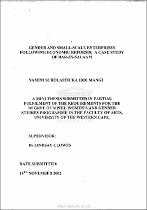| dc.description.abstract | This study is about Gender and small-scale enterprises following recent economic reforms in Tanzania. It deals with a case study of women entrepreneurs in Dar-es- Salaam, focusing on their prospects and problems, and the mechanisms they use to survive in a competitive free market. There is concern among policy analysts and gender activists that the economic reforms have negatively affected women entrepreneurs more than their male counterparts (Tibaijuka, 1992). However, these concerns have not yet been substantiated through detailed empirical evidence. The findings of my study reveal that it is a combination of factors which lead women entrepreneurs to establish small-scale enterprises. These motivating reasons are to fulfil the needs of their families such as school fees of their children. Similarly, Tanzanian women entrepreneurs start a small business so as to supplement their insufficient incomes, achieve independence and as a substitute to paid employment. However, they experience a variety of problems, such as the lack of business premises, high rental costs
at commercial areas, competition, lack of start-up and working capital from banks and micro-financial institutions, lack of information, and bureaucracy around business licenses. Women entrepreneurs have developed various tactics to handle such difficulties they encounter in their businesses. These are: locating their enterprises in near or around their homes, employing relatives and other people, charging competitive and differentiated prices, diversifying their businesses, working for extra hours, and establishing informal credit associations. The recommendations are: the government should clarify and shorten the procedures of licenses and business premises acquisition, provide more commercial areas with cheaper rentals. Similarly, the government should be sympathetic towards women when it formulates and implements its developmental policies, women should be informed about available training opportunities. Future studies should investigate a larger sample of women entrepreneurs in small-scale enterprises involved in other sectors using the feminist research methods. | en_US |

